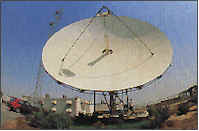|
|
Communications
 |
A sophisticated communication system uses seven earth stations. |
In keeping with his determination to build a modern state, King Abdul Aziz had wireless telegraph stations set up in Makkah, Taif, Jeddah and Riyadh in the early 1930s. When the world communications revolution began, the Saudi government launched ambitious projects to modernize the country's telecommunication system and since then has spent more than 23 billion dollars in that endeavor.
Saudi Arabia's telecommunication sector continues to grow at a remarkable rate, with the expansion of both facilities and services. The country's telephone system is already one of the world's most modern and efficient, and new microwave links with Arab countries have been opened to strengthen regional communication. The Kingdom boosted its telephone exchange capacity to more than 1.64 million lines in 1992, a dramatic rise from the 76,600 lines in place in 1970. An ambitious plan to increase the telephone network by one million lines by the year 2000 will bring state-of-the-art technology to more than 1,000 additional towns and villages. Domestic microwave service between smaller towns supplements the 9,300 mile 550-station microwave system. The Kingdom's seven standard earth stations link up with the Intelsat Satellite System, allowing subscribers to dial 185 countries directly. By 1993, Saudi Arabia also had more than 6,000 satellite circuits and 3,100 miles of coaxial cables. Submarine cables complement Saudi Arabia's wire and satellite network to make the country an international hub for communications. Telex has also seen impressive growth, with the number of lines increasing to 9,800 by 1992, linking 152 cities and villages to countries around the world. Saudi Arabia also utilizes the latest innovations in telecommunications, such as cellular telephones and pagers, that promise to serve the country's continuing progress.
Some especially exciting innovations in telecommunications in recent years have helped to strengthen Saudi Arabia's international links. In early 1985 the Kingdom, along with other members of the League of Arab States, launched Arabsat, the Arab world's first communication satellite, with its major ground station in Riyadh. Arabsat transmits to 7 5 million households in the country. On June 17, 1985, Saudi Arabian Payload Specialist Prince Sultan Bin Salman became the first Arab and the first Muslim to travel to space, aboard the United States space shuttle Discovery. During the mission, Prince Sultan helped launch the second Arabsat communication satellite. Another landmark achievement came in 1987, when the Kingdom inaugurated the King Fahd Telecommunications City at a cost of more than 66 million dollars. It is the largest facility of its kind in the Middle East, and the seventh earth station in the country for satellite transmission and reception.
The Saudi postal service has also participated in the growth of the communication sector. A total of 448 main post offices and 170 suboffices delivered 648.5 million postal articles in 1992 to 4,700 cities. towns and villages around the country. The main postal complexes at Dammam, Jeddah and Riyadh employ modern sorting equipment, and the General Directorate for Posts has established 11 regional offices throughout the country to coordinate and improve the efficiency of postal operations. Express and electronic postal delivery reaches many cities and towns in the Kingdom along with a number of foreign countries.
The transport and communication networks installed in the past 20 years have encouraged Saudi Arabia's modern development and enabled it to assume a significant and growing role in world economic and political affairs. As the Kingdom's population increases and the pace of life becomes ever more rapid, the country will continue to harness the benefits of the communications revolution to improve the quality of life for its citizens.
The Sixth Development Plan (1995-99) concentrates on improving the efficiency and quality of communication and transportation services in Saudi Arabia. In addition, the plan intends to improve economic performance by reducing production costs and utilizing advanced technology. By implementing the objectives of the plan, Saudi Arabia will have national communication and transportation networks capable of meeting the nation's social and economic needs into the next century .
|